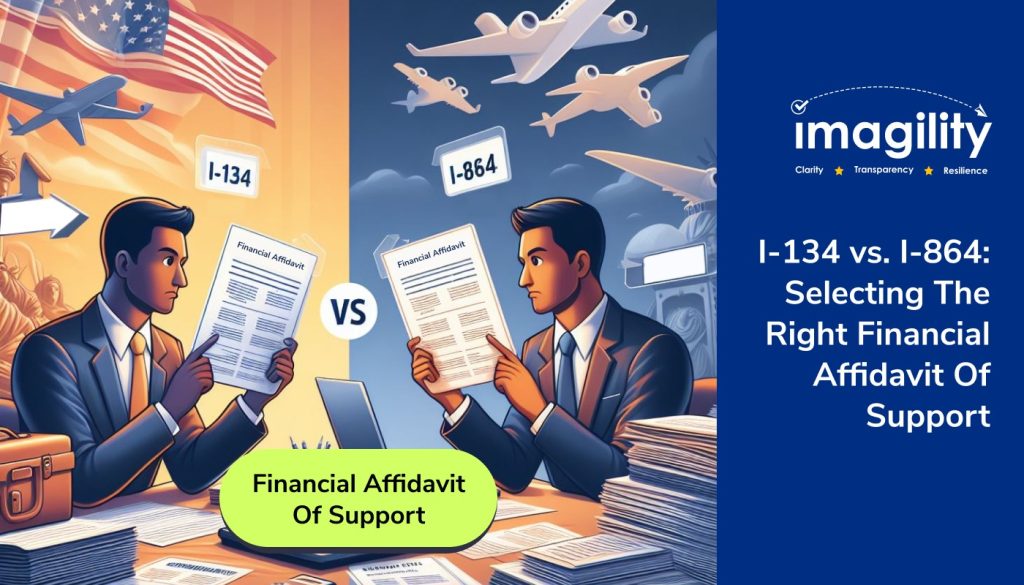Table of Contents
I-134 Affidavit of Support
I-864 Affidavit of Support
Choosing the Right Form
Conclusion
Navigating the complex immigration process in the United States can be challenging, especially when sponsoring a family member or loved one’s visa application. One crucial component of this process is the financial affidavit of support, which demonstrates the sponsor’s ability to financially support the immigrant during their stay in the U.S.
Two commonly used forms for this purpose are the I-134 and the I-864. Understanding the differences between these forms and knowing which one to choose is essential for a successful sponsorship process.
In this blog, we will dive into the intricacies of the I-134 and I-864 affidavits of support, helping you make an informed decision when sponsoring an immigrant’s visa application.
Let’s first discuss the I-134 affidavit of support!
I-134 Affidavit of Support
The I-134, also known as the Affidavit of Support, is primarily used for non-immigrant visa applications, such as fiance visas (K-1), visitor visas (B-1/B-2), student visas (F-1), or exchange visitor visas (J-1). It serves as a declaration of financial responsibility, where the sponsor assures that they have sufficient funds to support the applicant during their temporary stay in the United States.
Key Points:
- Non-binding Agreement
One of the fundamental differences between the I-134 and the I-864 is that the obligations outlined in the I-134 are not legally enforceable. Instead, they serve as a demonstration of the sponsor’s goodwill and financial ability.
- Limited Duration
The sponsor’s financial responsibility under the I-134 is typically limited to the duration of the applicant’s intended stay in the U.S. Once the visitor or student completes their visit or program, the obligations outlined in the I-134 do not apply.
- Income Requirements
While there are no specific income thresholds for sponsors under the I-134, they must demonstrate the ability to financially support the applicant based on their current income and assets. This may include providing evidence of employment, bank statements, or other financial resources.
I-864 Affidavit of Support
In contrast, the I-864, also known as the Affidavit of Support Under Section 213A of the INA, is required for most family-based and employment-based immigrant visa applications. This form establishes a legally binding contract between the sponsor and the U.S. government, ensuring that the sponsored immigrant will not become a public charge.
Key Points:
- Legal Obligation
By signing the I-864, the sponsor agrees to provide financial support to the immigrant at 125% of the federal poverty guidelines until the sponsored immigrant becomes a U.S. citizen, has worked for 40 quarters (equivalent to 10 years), or leaves the country permanently. This obligation is enforceable by law, and sponsors can be held liable for failing to meet their support obligations.
- Income Requirements
Sponsors must meet specific income thresholds based on household size to qualify as financial sponsors under the I-864. If the sponsor’s income is insufficient, they may use assets or the income of a joint sponsor to meet the requirements. These income requirements aim to ensure that the sponsored immigrant has adequate financial support to avoid relying on public assistance programs.
- Joint Liability
Sponsors signing the I-864 are jointly liable with the sponsored immigrant for any means-tested public benefits received by the immigrant while the affidavit is in effect. This means that if the immigrant receives public benefits, the government can seek reimbursement from the sponsor, joint sponsor, or household member who signed the I-864.
Choosing the Right Form
Now that we have explored the differences between the I-134 and I-864 affidavits of support let’s discuss how to choose the right form for your specific situation.
- Visa Type
The first step is to determine the visa application type you are sponsoring. Non-immigrant visa applications, such as fiance, visitor, or student visas, typically require an I-134 affidavit of support, while immigrant visa applications require an I-864 support.
- Legal Obligations
Consider whether you are comfortable with the legal obligations outlined in each form. If you prefer a non-binding agreement limited to the duration of the applicant’s stay, the I-134 may be the appropriate choice. However, if you are willing to assume a legally binding obligation to provide ongoing financial support, the I-864 may be more suitable.
- Financial Eligibility
Evaluate whether you meet the income requirements for the chosen affidavit of support. If you are sponsoring an immigrant visa application and do not meet the income thresholds for the I-864, you may need to enlist the support of a joint sponsor or use assets to supplement your income.
Conclusion
Choosing the right financial affidavit of support is essential for a successful visa sponsorship process. Whether you opt for the non-binding I-134 affidavit of support for temporary non-immigrant visas or the legally binding I-864 affidavit of support for immigrant visas, understanding the differences between these forms and assessing your financial eligibility is crucial.
Sponsors can easily support their loved ones’ immigration journey by selecting the appropriate form and fulfilling the obligations outlined therein. However, you can also use Imagility, an AI-enabled immigration software, to apply for immigrant and non-immigrant visas. The platform also lets you analyze built petitions to improve visa approval chances.









